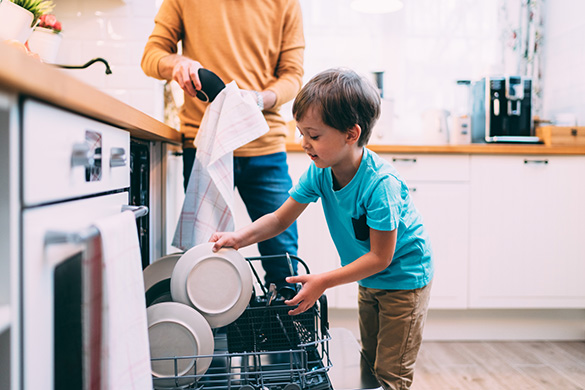
We live in a time of great technological innovation and expendable income, which together have made many household chores a thing of the past for some of us. From robots vacuuming and mopping our floors, and even mowing our lawns, to grocery delivery and curbside pickup, we are now able to free up a lot of our time to focus on what is most important to us. Add to that the cleaning, cooking and lawncare services that many of us utilize, and many of the jobs that use to be shared among the younger members of our households are already being handled by a professional. But are there unforeseen consequences to this easier lifestyle?
Even the most well-meaning parents may be unintentionally raising kids who do not know how to complete basic household chores. After all, if you are paying someone to keep your house spotlessly clean, why do you need to send the kids to dust, vacuum, or clean bathrooms? But experts agree that teaching children how to take care of a home, and how to be responsible and follow through with responsibilities, is a very important part of growing up. Even if a professional house cleaning service will be going behind them and redoing their work, having a child learn the process of cleaning is worth the time and trouble.
Many parents still struggle with determining what are the appropriate chores to start kids out on, and at what age they should start being responsible for these tasks. That depends greatly on not just age but also maturity, but even toddlers can learn to put toys into a basket with you as you straighten up each day. Read on for some age specific suggestions for chores your kids can begin doing, whether it’s to help you around the house, or help themselves for the future.
Toddlers (Age 2-3)
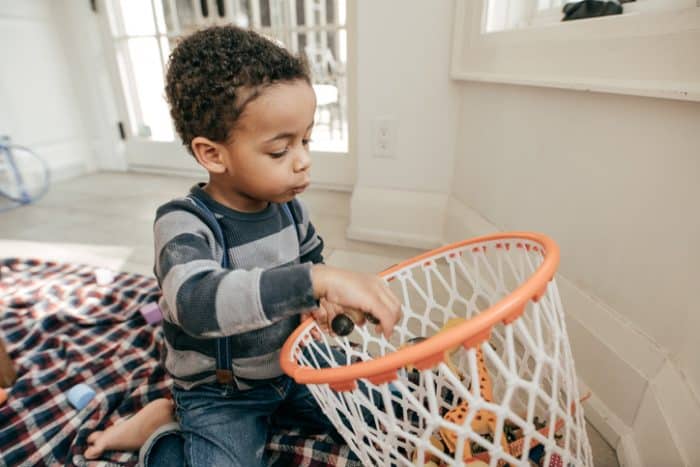
At this age, everything is a game, which means you can make chores fun, as your toddler copies what he or she sees you doing. Keep as many of their toys as possible in bins on the floor so that clean-up after a play session is accessible for them. The same is true for picture books on a floor-sitting bookshelf. Sing a fun song or say a rhyme as you put the toys and books where they go. After a few days, you’ll only need to sing the song and instruct them that it is clean up time, and they will know what to do.
There are several other jobs around the house that your toddler can help you with, even if they are not yet ready to tackle the task completely on their own. While you are making a bed, have them hand you the pillows, and run around to each side of the bed, pulling to straighten the covers and remove the wrinkles. If it is time to sort laundry, have them help you make the piles of clothes and towels. Talk about what you doing and why as you are working, so that even before they are able to do the work, they understand what is going on.
Don’t get discouraged from the process if it seems like they aren’t helping very much, or even if they end up making a bigger mess while trying to help. At this age you are not so much looking for results or quality. You are instead laying the foundation for the “helper” mindset, and starting your kids off as someone who will want to help later, and who will value cleanliness and organization. So ignore the spilled water from the eager toddler who wanted to help with the dog’s bowl – or better yet, toss a towel their way and teach them about how every little mess-up has a simple solution.
Preschoolers (Age 4-5)
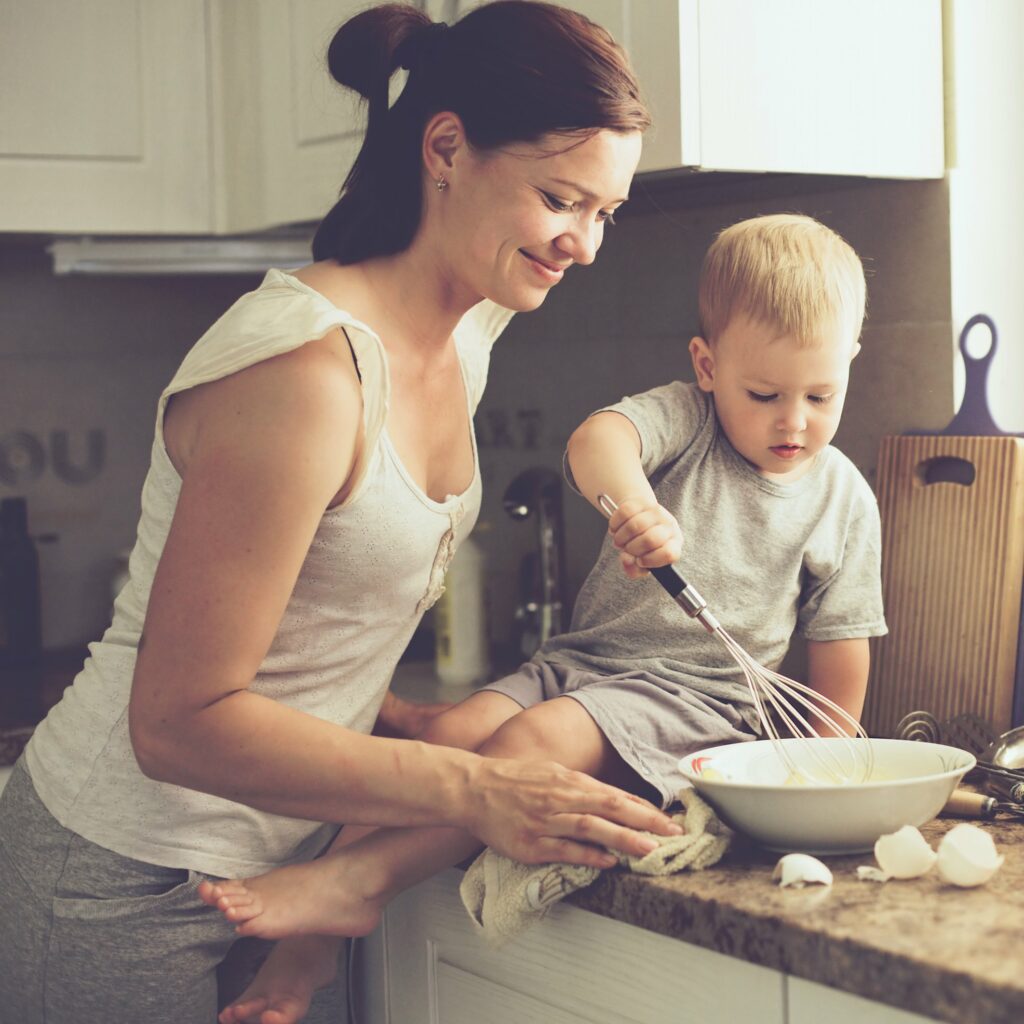
Preschoolers are naturally eager helpers, wanting to take on more and more tasks, often with an independent, “I can do it by myself” attitude. While that is obviously not true, you can still capitalize on this eagerness. Some of the best chores to begin at this age include:
- Getting dressed on their own, including putting dirty clothes away in the proper hamper. To help your child be successful with this, put as many of their frequently worn clothes as possible in the lowest drawers in their room.
- Helping to clear the dinner table. You may want to hold off on asking them to carry fine china and crystal, but your preschooler can take their casual dinnerware and plastic cups to the sink or dishwasher.
Laundry assistant. You can teach a preschool the basics of folding using small hand and dish towels, and washcloths. A child this age can also match their own socks and stack their underwear. Give your preschooler his or her own basket to work on beside you as you fold the larger items. Your little helper can also assist you in loading the washer and dryer, and removing clean laundry into the appropriate basket.- Basic cooking tasks. Stirring, pouring from a small measuring cup, washing vegetables – these are just a few of the tasks that come to mind when you have a child eager to help in the kitchen. For simple informal meals, allow your preschooler to spread the mustard and place the meat and cheese on a sandwich, or to butter toast. Children this age gain an amazing amount of confidence from helping to prepare a meal the entire family will be partaking in.
Young Elementary Age (6-8)
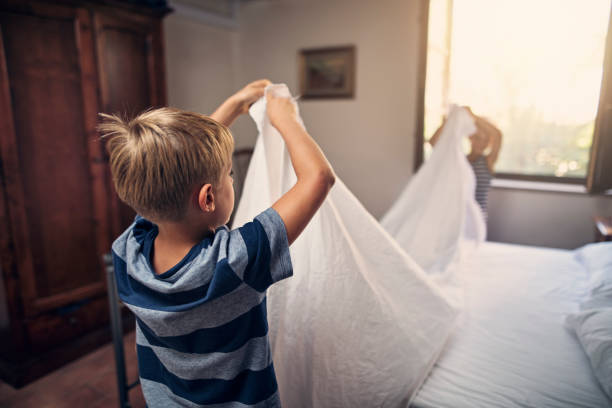
By age 6, your child is likely mature enough to handle being responsible for a regularly scheduled chore. As adults, we often have chores we prefer over others, so give them input into mapping out what will fall on their plate. If your child has developed a love for all things laundry but a hatred for food prep, its OK to make laundry a regular responsibility, though occasionally pushing him or her into the kitchen will hopefully help them to still gain the skills they’ll need later on.
At this point, your 6-8 year old should be able to make their own bed, and keep their room relatively neat, with toys and books put away and clothing stowed in its proper place. These tasks to take care of personal space should be the first priority when it comes to chores. Additionally, now is a great time to designate certain tasks for each child, something they can take ownership of and be proud of when a good job is noticed. Possible chores for this list include:
- Feeding pets – making sure water bowls are kept full and food bowls are filled at the appropriate times.
- Unload the dishwasher – with the understanding that adults may still need to put away any dishes that go on shelves that are still out of reach.
- Garden and lawn chores – your child can pull weeds in a garden, water plants and help with raking leaves.
- Put away groceries – with the exception of large and heavy items, your child should be able to unpack your bags from a grocery store trip and put everything in its proper place, recognizing what belongs in the freezer or refrigerator as opposed to the pantry.
Later Elementary Years (9-11)
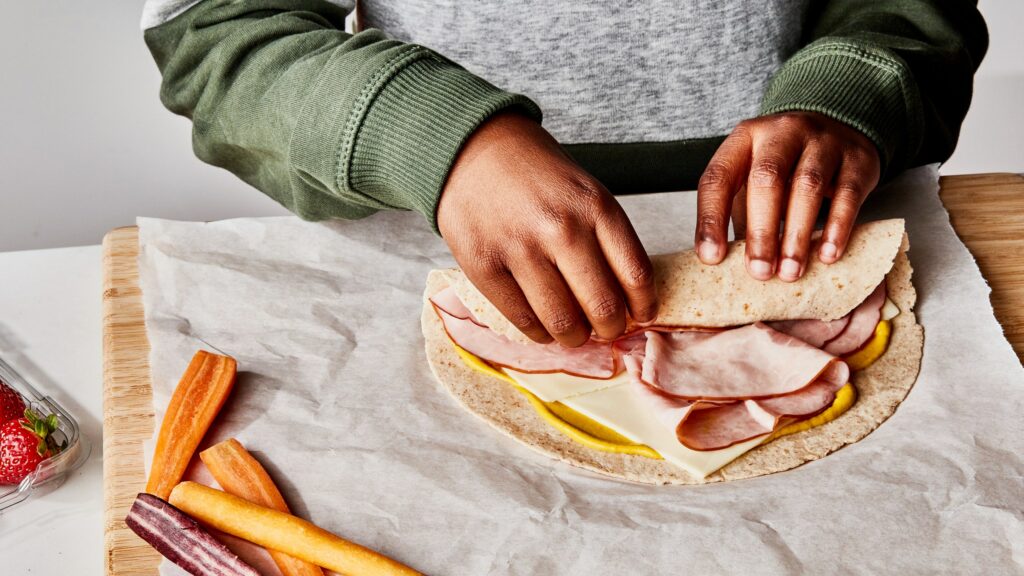
The tween years are a transitional time in your child’s life when it comes to household responsibilities. On the one hand, your child has never been so responsible and knowledgeable about what needs to be done around the house. At the same time, other things are often occupying their minds, such as spending time with friends, participating in sports, and allowed screen time.
One of the best ways to keep your tween interested in helping around the house is to assign chores to them that directly relate to their own well being. Many children at this age are able to make their own simple breakfast before school, such as pouring cereal and milk or using the microwave or toaster to heat something. If your child tends to take their own lunch to school, they can now participate in packing their school lunchbox themselves. Your tween can also be put in charge of making sure that all of his or her homework is complete each day, and at this age you can transition away from checking behind them every night.
Additional household chores that can be easily completed by your 9 to 11 year old child include rolling garbage cans and recycling bins out to the curb and back in. Let your child know it is OK to ask for assistance if a can is heavier than usual or overfilled. If your child has their own bathroom, now is also a great time to show them how to thoroughly clean it, and put them in charge of doing so. Also at this age, your child should be able to complete a load of laundry from start to finish, from proper sorting to what detergent and other additives are needed for each load, along with loading and unloading the machines.
Young Teens (12 – 14)

By now you have a teenager on your hands, and may find that their eagerness for chores has begun to wane even more. There’s definitely irony in having a child who is able to do much more than ever before to help around the house but is feeling less inclined to do so. However, it is important to maintain a chore schedule so that your teen continues to feel responsible for maintaining their home, and so that previously learned skills do not get rusty. Continue to encourage them to clean and take care of their own space in the house, through making their beds and keeping their bedrooms and if applicable, bathrooms, neat and tidy.
Your teen should be responsible for their own laundry at this point, including bed linens. Cooking is also a manageable task for children this age, as most can be trusted with the sharper knives necessary for slicing and dicing vegetables. Plan a meal they can cook for the family from start to finish and encourage them to do so on at least a monthly basis. Additional responsibilities such as walking the family dog, babysitting younger siblings for short periods of time, and helping with seasonal yard work such as spreading mulch and trimming bushes are also great chores for your teen.

